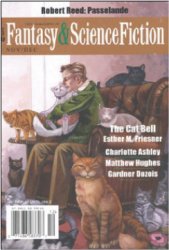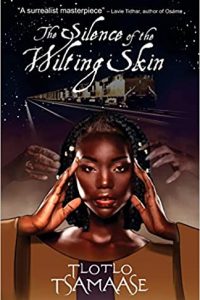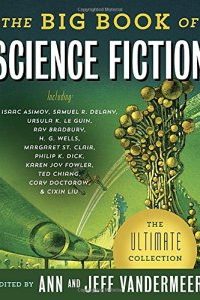Rich Horton reviews Short Fiction, January 2017
F&SF 11-12/16
Interzone 11-12/16
Analog 12/16
Tor.com 11/02/16, 11/16/16
The Starlit Wood, Dominik Parisien & Navah Wolfe, eds. (Saga Press) October 2016
 F&SF for November/December features a rare and welcome appearance from Gardner Dozois, whose fame as an editor should not cause us to forget how good his fiction is. ‘‘The Place of Bones’’ is a short, stylish dark fantasy told by the tutor of a younger son of a French nobleman. The young man becomes a prodigious scholar, and discovers a way into the mysterious Dragonlands, somewhere not quite in Southeastern Europe. The tutor tells of their desperate trip into these lands, whence no one returns, and what they find – or hope to find – there. Robert Reed contributes a long novelette, ‘‘Passelande’’, about people’s virtual backups, and what might happen if they achieve some sort of independence from their owners. Lucas Pepper has gained some notoriety among the secretive backup community – having been able, as a physical human, to help some backups with various problems. His latest is a bit tricky – one person’s backup is convinced that her original’s boyfriend is up to no good. All this is interesting, but Reed, thoughtful as ever, works his way through to some more disturbing implications of the interactions virtual ‘‘people’’ have with physical people – including a new art form.
F&SF for November/December features a rare and welcome appearance from Gardner Dozois, whose fame as an editor should not cause us to forget how good his fiction is. ‘‘The Place of Bones’’ is a short, stylish dark fantasy told by the tutor of a younger son of a French nobleman. The young man becomes a prodigious scholar, and discovers a way into the mysterious Dragonlands, somewhere not quite in Southeastern Europe. The tutor tells of their desperate trip into these lands, whence no one returns, and what they find – or hope to find – there. Robert Reed contributes a long novelette, ‘‘Passelande’’, about people’s virtual backups, and what might happen if they achieve some sort of independence from their owners. Lucas Pepper has gained some notoriety among the secretive backup community – having been able, as a physical human, to help some backups with various problems. His latest is a bit tricky – one person’s backup is convinced that her original’s boyfriend is up to no good. All this is interesting, but Reed, thoughtful as ever, works his way through to some more disturbing implications of the interactions virtual ‘‘people’’ have with physical people – including a new art form.
Beside those veterans, a newcomer shines. Charlotte Ashley’s ‘‘A Fine Balance’’ concerns a city ruled by two families (or clans, or parties…), in which the balance of influence between the two is controlled by a series of duels between their various champions. At this time the greatest champions are Shoanna Yildirim and Kara Ramadami. Mistress Yildirim’s assistant/apprentice tells the story of their last duel, and the lead-up to it, in which Yildirim’s family has been losing – and losing influence, while the two champions have not met for some time. The story combines neat dueling action with unfamiliarly manifested (but familiarly motivated) political intrigue.
In the November/December Interzone, who should turn up but Rich Larson! ‘‘You Make Pattaya’’ is a fine caper story. Dorian is a grifter in the tourist town of Pattaya, Thailand. He concocts a scheme with a prostitute he’s taken a bit of a fancy to, involving blackmailing a pop star in Thailand on a sex vacation. The story is straightforward and slick, noirish near-future crime, with minimal but well-placed SFnal elements (a bit of gender ambiguity, some plausible surveillance tech).
Samantha Henderson’s ‘‘My Generations Shall Praise’’ is a strong dark SF story. It posits a new twist on the death penalty: the condemned can agree to serve as a host body for a transplanted personality. They – their core – die, but there’s a lot of money involved for their heirs. It’s told from the point of view of the criminal, a woman who has lived a tough life and killed enough people to be deserving – but she has a child who has a chance for a better life. Anyway, Helena MacGraw, the very rich woman who wants a new body thinks the offer of money for the daughter will sway the narrator. Helena doesn’t understand, perhaps, that not everyone has the same motivational triggers. There’s a very nasty, and logical, twist to the scheme that sells the story, and makes it scary.
Analog for December (their last monthly issue, we hear!) has several nice stories, all definitely Analogish in flavor, but mixing in some voices new to the magazine, like Gord Sellar, Nisi Shawl, and Eliot Fintushel. Of those three, I really liked Sellar’s ‘‘Prodigal’’, in which a couple use a new treatment to ‘‘sentientize’’ their dog. Benji (the dog) is like a child, and very inquisitive, but of course also still a dog. When they have a human child, he begins to wonder why he and the child are treated differently. He also begins to wonder why dogs in general are treated differently. For example, why they are so often euthanized. Sellar follows the notion to its logical conclusion: Benji becomes radicalized, and of course the questions the story raises have implications outside those concerning the ‘‘sentientization’’ treatment.
Two stories by Analog regulars are also worth particular notice. James Van Pelt’s ‘‘The Continuing Saga of Tom Corbett: Space Cadet’’ is about a girl named Tomika Corbett who discovers the old Tom Corbett juvies and becomes fascinated by space. She desperately wants a career in space, and is even more motivated, in the long run by her inevitable Space Cadet nickname, and by the resistance of teachers who disparage the old Tom Corbett books (which really were quite awful, to contemporary eyes, as I recently learned when I read one). She begins to dream of aliens coming to take her away – and she tentatively befriends another bullied kid, even smarter than her – which gives her a tough choice when – in her dreams (?) – the aliens really come. I thought this story striking for the way in which what seems old-fashioned wish-fulfillment is revealed to be a terribly sad meditation on the contemporary loss of the dream of the future we once seemed to share. Martin Shoemaker’s ‘‘Black Orbit’’ is more conventional Analog adventure, and a very good example of such, with an internal affairs spy in the Jupiter system uncovering evidence of criminal activity, and having to find a way to get that information back to Earth, even if she dies, even despite the harsh reality of orbital mechanics. Add in some nice speculation about the ‘‘trust economy,’’ and about AIs with minds of their own, and you have a really solid story.
There’s some nice stuff in November at Tor.com as well. ‘‘The Loud Table’’ by Jonathan Carroll opens with four older men who regularly sit and gab at a coffee shop. They’re mourning the loss of their fifth, who just died of cancer, and of course discussing their own maladies, including the one so many of us fear, Alzheimer’s. (I assume by us I mean all of us, but I’m 57, so perhaps I just mean us old men!) One of the men discusses his memory loss – which makes him fear the disease, of course. For example, this one beautiful girlfriend…. And the narrator makes him an offer…. I’ll let Carroll reveal the sting. It’s a modest story, but enjoyable and expertly told.
Caighlan Smith’s ‘‘A Pest Most Fiendish’’ is also modest in ambition, but lots of fun. Philippa Kennedy Kipling, or Pippa, and her part-clockwork servant, the Porter, are freelance contractors, dealing with magical infestations. This time they take a job ridding a planned vacation chalet of lichfiends (undead revenants of a sort) that seem to have been possessing the construction workers. Of course there are complications and twists, all very cleverly handled. It’s a sprightly story, and funny – the relationship of Pippa and the Porter is a particular treat.
The Starlit Wood is a first-rate anthology of reimagined fairy tales. Reimagining fairy tales is nothing new, of course (in these pages long ago I remember noting that Cinderella retellings are a dime a dozen), but every year we see evidence that there’s still plenty of life in those old tropes. (It’s worth mentioning, as well, that The Starlit Wood, as a physical object, is quite lovely.)
Perhaps the most overt ‘‘reimagination’’ is Sofia Samatar’s ‘‘The Tale of Mahliya and Mauhub and the White-Footed Gazelle’’, which looks at an Arabic tale of at least a millennium ago, translated into English for the first time only last year. Samatar’s story literally ‘‘deconstructs’’ it, takes it apart, looks at each of the characters, and then cunningly reassembles it, in front of the reader, in the context of the present. It is, on the one hand, clever, but still it remains a story, and a moving story.
More traditional in form is ‘‘The Other Thea’’ by Theodora Goss, which takes the central idea of Hans Christian Andersen’s ‘‘The Shadow’’ (that a person might become disconnected from their shadow, which is sort of an other self, an alternate version of them), and makes a new story of it, one related to a couple of her best earlier stories, ‘‘Miss Emily Gray’’ and ‘‘Lessons with Miss Gray’’. Thea (surely a significant name choice!) has been drifting through life in the months since graduating from Miss Lavender’s School of Witchcraft, and ends up drifting back to the school, where she is told that she must find her shadow, which had been cut off by her grandmother when she was just a child. So she travels to the Other Country, and, of course, does find her shadow – or it finds her – but who says the shadow wants anything to do with her? It’s a beautifully written story, and great fun, but perhaps a bit thin next to the Samatar story, and to my other favorite in the book.
This is Naomi Novik’s ‘‘Spinning Silver’’. As one might guess, Rumpelstiltskin in the base story. The conceit is that instead of spinning straw into gold, a moneylender might be seen as spinning silver (a small amount of money) into a larger amount (gold). The narrator is the daughter of a poor village moneylender, too kindly to make a living. The daughter, however, has learned to harden her heart to her father’s clients’ troubles – which often enough are invented anyway – and under her stewardship the family has prospered – but at what cost? Especially when a fairy creature called the Staryk learns of her abilities, and insists that she spin his silver into gold. The mechanism she uses is clever, and the expected complications ensue, especially when the local Duke becomes involved. Novik very effectively layers the story with meaning – most notably the status of the moneylenders, who are (of course) Jewish – which points as well to a perhaps sometimes missed element of Rumpelstiltskin’s traditional portrayal. As with many of the stories in this book (and indeed in most contemporary fairy tale versions) the agency or lack thereof of the female characters is also central, and quite matter-of-factly and honestly treated.
‘‘A Fine Balance’’, Charlotte Ashley
(F&SF 11-12/16)
‘‘The Loud Table’’, Jonathan Carroll
(Tor.com 11/02/16)
‘‘My Generations Shall Praise’’,
Samantha Henderson (Interzone 11-12/16)
‘‘Spinning Silver’’, Naomi Novik
(The Starlit Wood)
‘‘The Tale of Mahliya and Mauhub and the
White-Footed Gazelle’’, Sofia Samatar
(The Starlit Wood)
‘‘Prodigal’’, Gord Sellar (Analog 12/16)
‘‘A Pest Most Fiendish’’, Caighlan Smith
(Tor.com 11/16/16)
‘‘The Continuing Saga of Tom Corbett: Space Cadet’’, James Van Pelt (Analog 12/16)





Hi, Rich. I’m glad you enjoyed my Tom Corbett story. I remember loving the books when I was ten, but they truly are difficult reading now. I reread their inspiration, though, Robert Heinlein’s SPACE CADET, and it holds up much better.